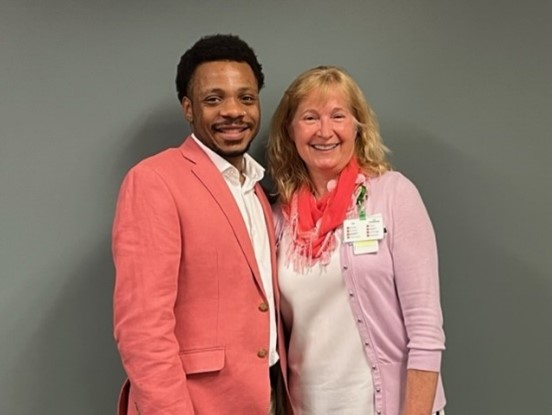Music Therapy Strikes a Chord with Couples
Music Therapy Strikes a Chord with Couples
For the opening of his romantic comedy “Twelfth Night,” William Shakespeare composed a line more than 400 years ago that continues to this day to perfectly convey the beauty and power of the music therapy we provide to couples here at Gilchrist.
No, Shakespeare probably didn’t know anything about hospice or the clinical and evidence-based use of music interventions. But the great bard clearly knew more than a thing or two about the charmed connection between music and love. Otherwise, he could not have crafted this:
“If music be the food of love, play on … .”
Whether you doubt or believe that music is, in fact, the food of love, you’ll want to read on to hear for yourself what our team learned from studying the impact of music therapy on couples.
Emotional Expression, Feelings of Connection
Music therapy is a well-established and clinically proven method of addressing the physical, emotional, cognitive, and social needs of individuals in hospice. Gilchrist’s successful music therapy program, for instance, is now in its 11th year of practice.

What isn’t as well-established is the efficacy of music therapy on couples – either those where both partners are in hospice or where one is in and the other is not. Wanting to know more, Gilchrist’s Demetris Chambliss and Helen Craig – two music therapy interns preparing for the national board exam – recently completed and presented case studies based on their own therapeutic work with four such couples. What they found is not only enlightening, but also truly, positively enchanting.
Demetris focused on one couple. Both husband and wife are in their 90s and on hospice (To protect patients’ privacy, we’re not going to identify anyone by name in this article.). They’ve been married for more than 70 years. He has heart issues; she has Alzheimer’s disease.
Both clearly benefitted on an individual basis from multiple sessions of music therapy. Listening to music and singing along noticeably relieved their physical discomfort, anxiety, and agitation, and the engagement lifted their spirits. The wife, who struggles to formulate sentences, recalled and sang song lyrics. This alone would count as a great success. But so much more was also accomplished.
Leading the Couple
Music therapy led the couple to engage in traditional spousal roles. They reminisced and expressed affection. With Demetris’s facilitation and music performances, the couple discussed the keys to a successful romantic partnership of more than seven decades. Their response: Compromise, collaboration, and a commitment to trying always to understand the other.
In her work, Helen observed similar results with the three couples for whom she cared – two of them made up of one partner in hospice and the other not in hospice. Music therapy cultivated for the couples an atmosphere and opportunity to slip out of their roles of patients and caregivers and back into their roles as partners. The experience evoked the vows they took to love and cherish, to have and to hold, in sickness and in health.
What is more, the resumption of original couple roles can help with anticipatory grieving, as partners will be able to look back on the last days and recall them being filled with love songs, memory sharing, dancing, and more. The exchange underscores that, despite the progression of disease and death, what was truly important was the relationship, the bond, the trust, and ultimately the commitment.
Music therapy for couples seems to open a door to emotional expression and to feelings of connection and acceptance.
Just as Shakespeare wrote, music can be the food of love for hospice patients and their partners when delivered by expert, caring therapists like ours. May the music play on.
Learn more about Gilchrist hospice careSupport our Music Therapy program


